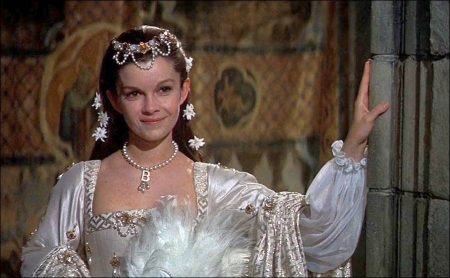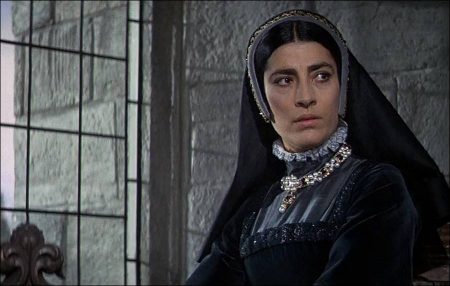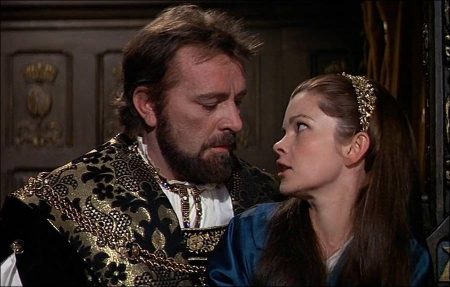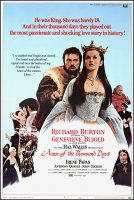Anne of the Thousand Days movie storyline. King Henry VIII (Richard Burton) of England is contemplating what to do about his nearly one thousand day union to his second wife, Anne Boleyn (Geneviève Bujold). The marriage has been controversial in that he, a devoutly religious man, had to break ties with the Catholic church in Rome so that he could divorce his first wife, Catherine of Aragon (Irene Papas), whom he married for political reasons. As such, many of his subjects consider his marriage to Anne as being not valid, and Anne a whore.
The marriage to Anne has also been tempestuous as Anne wanted to marry the young Lord Percy (Terence Wilton), with whom she was in love. But Anne eventually learned to love the power that being Queen of England would bring, a position which was fostered by her family, who could only see the benefit of such a union. The King’s current contemplation of what to do stems from what he sees as Anne not fulfilling her end of the marriage in not producing a viable male heir to become the next King of England.
She only bearing a daughter, Elizabeth (Amanda Jane Smythe), and a stillborn son. He sees Jane Seymour (Lesley Paterson), one of Anne’s ladies-in-waiting, as being a potential Queen in her place. As much as Henry will do whatever in his power to get that desired male heir (his union to Catherine also produced only a daughter), Anne, who Henry professes to love, will do anything to ensure what she considers her and Elizabeth’s rightful place within the monarchy.

Anne of the Thousand Days is a 1969 British period drama film based on the life of Anne Boleyn, directed by Charles Jarrott and produced by Hal B. Wallis. The screenplay by Bridget Boland and John Hale is an adaptation of the 1948 play of the same name by Maxwell Anderson.
The film stars Richard Burton as King Henry VIII and Canadian actress Geneviève Bujold as Anne Boleyn. Irene Papas plays Catherine of Aragon, Anthony Quayle plays Cardinal Thomas Wolsey, and John Colicos plays Thomas Cromwell. Others in the cast include Michael Hordern, Katharine Blake, Peter Jeffrey, Joseph O’Conor, William Squire, Vernon Dobtcheff, Denis Quilley, Esmond Knight, and T. P. McKenna, who later played Henry VIII in Monarch. Burton’s wife Elizabeth Taylor makes a brief, uncredited appearance.
Despite receiving some negative reviews and mixed reviews from The New York Times and Pauline Kael, the film was nominated for 10 Academy Awards and won the award for best costumes. Geneviève Bujold’s portrayal of Anne, her first in an English language film, was very highly praised, even by Time magazine, which otherwise skewered the movie. According to the Academy Awards exposé Inside Oscar, an expensive advertising campaign was mounted by Universal Studios that included serving champagne and filet mignon to members of the Academy following each screening.

About the Production
The play Anne of the Thousand Days, the film’s basis, was first enacted on Broadway in the Shubert Theatre on 8 December 1948; staged by H.C. Potter, with Rex Harrison and Joyce Redman as Henry VIII and Anne Boleyn respectively, running 288 performances; Harrison won a Tony Award for his performance.
Cinematically, Anne of the Thousand Days took 20 years to reach the screen because its themes – adultery, illegitimacy, incest – were then unacceptable to the U.S. motion picture production code. The film was made on such locations as Penshurst Place and Hever Castle, and at Pinewood and Shepperton Studios. Hever Castle was one of the main settings for the film; it was also the childhood home of Anne Boleyn.
British actress Olivia Hussey was the first choice for the role of Anne Boleyn. When producer Hal B. Wallis first met Hussey in New York in November 1967 at a party for her then upcoming film Romeo and Juliet (1968), he offered her the title role. In addition, he also offered her to star with John Wayne in True Grit (1969).
In her 2019 memoir, Hussey stated that she had “mumbled something about being interested in Anne of the Thousand Days” but added that she “couldn’t see herself with Wayne”. She claims that this “adolescent and opinionated” remark inevitably ended her professional relationship with Wallis, and he immediately withdrew his offer from her. “It had taken me less than a minute to talk my way out of it” Hussey stated.
Maxwell Anderson employed blank verse for parts of his play, but most examples of this were removed from the screenplay. One blank verse episode that was retained was Anne’s soliloquy in the Tower of London. The opening of the play was changed, with Thomas Cromwell’s telling Henry VIII the outcome of the trial and Henry’s recalling his marriage to Anne rather than Anne’s speaking first and then Henry’s remembering in flashback.
Anne of the Thousand Days (1969)
Directed by: Charles Jarrott
Starring: Richard Burton, Geneviève Bujold, Anthony Quayle, John Colicos, Irene Papas, Michael Hordern, Valerie Gearon, Michael Johnson, Peter Jeffrey, Joseph O’Conor, Nora Swinburne
Screenplay by: Bridget Boland, John Hale
Production Design by: Maurice Carter
Cinematography by: Arthur Ibbetson
Film Editing by: Richard Marden
Costume Design by: Margaret Furse
Set Decoration by: Peter Howitt, Patrick McLoughlin
Art Direction by: Lionel Couch
Music by: Georges Delerue
MPAA Rating: None.
Distributed by: The Rank Organisation (UK), Universal Pictures (US)
Release Date: December 18, 1969 (United States), February 23, 1970 (United Kingdom)
Views: 369

